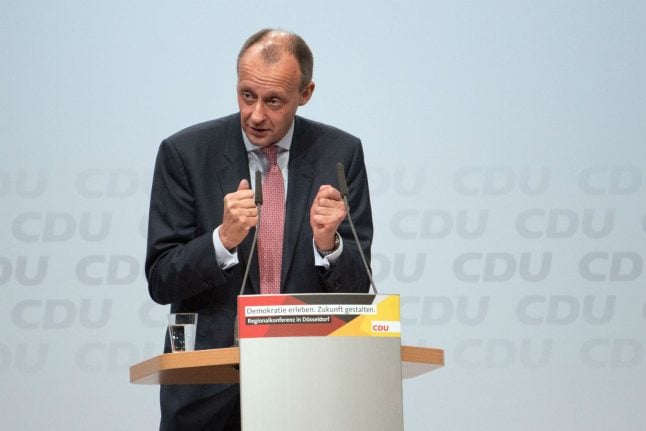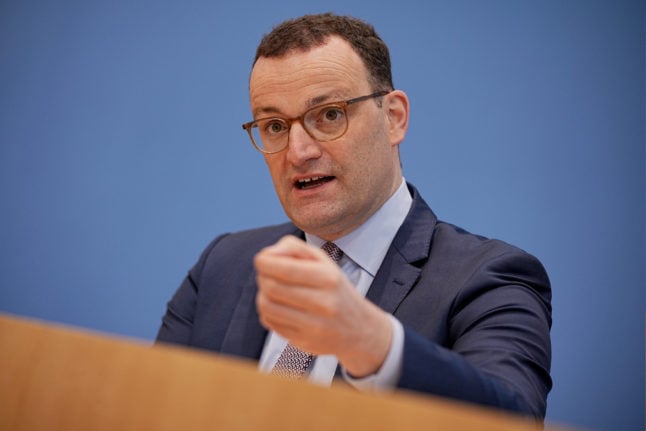The former head of the Christian Union (CDU) faction took centre stage on Wednesday evening at a CDU regional conference in Düsseldorf, where the three most promising candidates presented themselves.
“There is no Sharia law on German soil,” Merz said. Freedom of religion also applies to Muslims, he said, but they are subject to Germany's secular law.
Merz, who has been dubbed by German press as the 'anti-Merkel' due to his differing stances to the Chancellor and contrasting political style, also called for better state supervision of religious schools for Muslims.
“Our children cannot be taught in the state schools and indoctrinated in these schools,” he said.
Merz, 63, was met with standing applause by almost half of the 3,800 CDU members after his speech in the introduction round. His competitors, CDU General Secretary Annegret Kramp-Karrenbauer, 56, and Health Minister Jens Spahn, 38, received friendly applause, but no standing ovations.
SEE ALSO: 'Anti-Merkel' convinced he can take spot as CDU leadership race heats up
Kramp-Karrenbauer, also known as AKK, said that if you don't want Islamic schools in Germany, you have to make a state offer for Muslim education in German.
Spahn demanded that mosques in Germany should no longer be financed from abroad. “We want Federal President Steinmeier to open mosques, not Turkish President Erdogan.”
Recep Tayyip Erdogan opened the Ditib Central Mosque in Cologne at the end of September during a state visit.
The fourth German Conference on Islam (DIK) started on Wednesday with a controversial debate about foreign influences in German mosques. The opening event in Berlin was accompanied by a violent exchange of blows between conservative and liberal Muslims.
Interior Minister Horst Seehofer had also called on the Islamic communities in Germany to gradually free themselves from foreign donors.
SEE ALSO: How Seehofer is pushing to ‘replace foreign influence’ at Islam Conference
Merz and Spahn both come from North Rhine-Westphalia, the most populous German state. Within it, the largest CDU state association provides almost a third of the 1000 delegates for the decisive federal party conference slated to take place at the end of next week. After 18 years, Angela Merkel is relinquishing her CDU chairmanship, but wants to remain Chancellor until the end of her term in 2021.
Candidates continue on tour
Spahn, Kramp-Karrenbauer and Merz will introduce themselves to members from Bremen and Lower Saxony this Thursday at the penultimate regional conference (starting at 6 p.m.). Around 1000 CDU members are expected in Bremen. The last of the altogether eight regional conferences is on Friday in Berlin.
Merz, who had previously promoted a German ‘Leitkultur’ (mainstream culture), said that the CDU was the party with a “healthy and moderate patriotism”.
He added: “We say yes to Germany and also to German national interests, not in the sense of exaggerated nationalism”.
Spahn promoted a “healthy patriotism that invites everyone and excludes no one”.
Kramp-Karrenbauer stated that her goal was to lead the Union back to election results of 40 percent. “We will be measured by the hurdle.”
With Merkel in the lead in the Bundestag elections over a year ago, the Union had only achieved 32.9 percent – the second-worst result since 1949. Currently, the Union is around 26 percent in polls.
Merz affirmed that the downward trend of the CDU must be stopped and reversed. The reason behind it, he said, was that the CDU's positions had suffered in recent years. He assured that, as the new CDU leader, he would not strive for the end of the grand coalition.
“There is no reason at all to speculate about new elections,” he said. “We have an elected government.”
Merz and Spahn also attacked the Greens, who are currently over 20 percent in polls. It is a “double standard” if the Greens decide to protest in the Hambach forest for open-cast lignite mining, but then chain themselves to trees, Spahn said.
Merz said: “The Greens must clarify their relationship to this state's monopoly on the use of force.”
Spahn, the current Health Minister, predicted that people would have to be prepared to retire even later in the future.
“With increasing life expectancy, the retirement age from 2030 must also continue to rise.” So far, the retirement age has been raised in stages until 2029. For those born after 1964, it is set at 67.
SEE ALSO: Should people without children be forced to pay more tax in Germany?



 Please whitelist us to continue reading.
Please whitelist us to continue reading.
Member comments